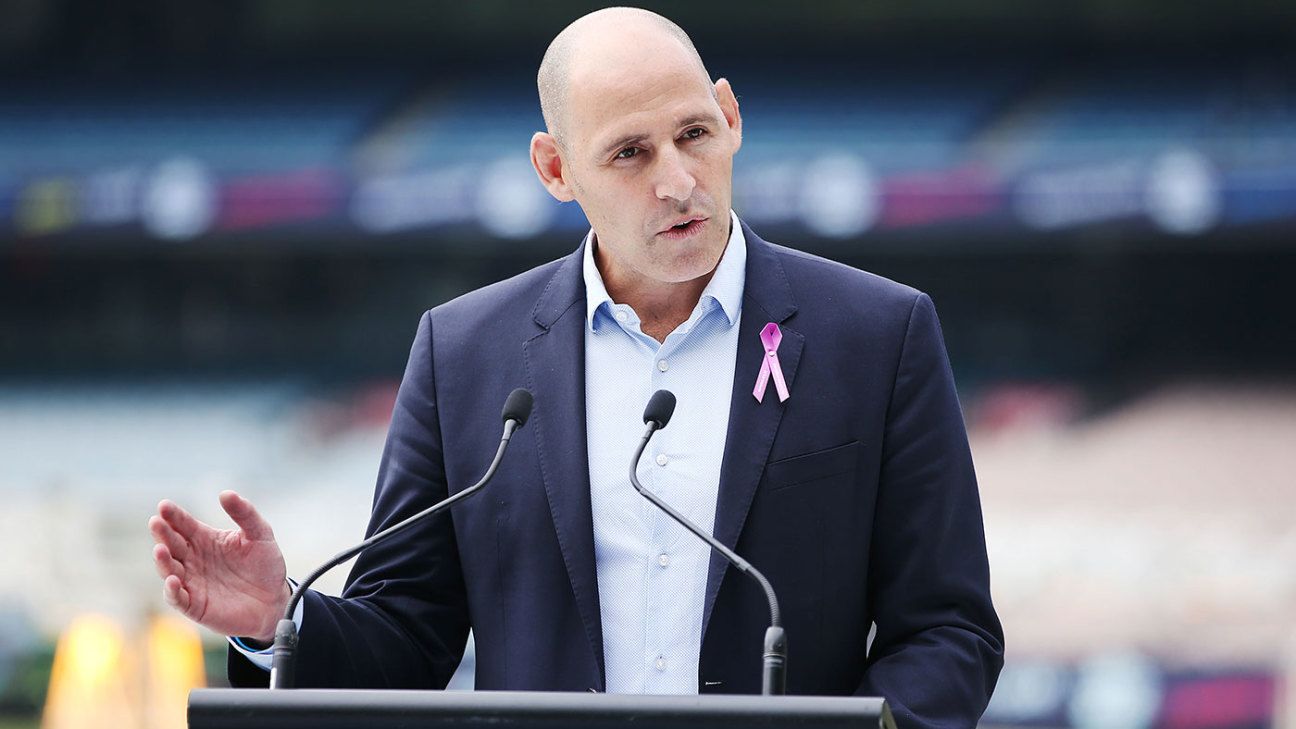
Freed from uncertainty around the postponement of the Twenty20 World Cup, Cricket Australia's interim chief executive Nick Hockley is confident of resolving the financial impasse with the governing body's state association owners that ultimately played a large part in costing predecessor Kevin Roberts his job.
While the dissenting associations of New South Wales and Queensland last week rejected CA's new proposal for pre-emptive cuts to be replaced by quarterly reductions based on any actual revenue shortfalls this summer, Hockley and the CA chairman Earl Eddings have remained in open dialogue with the states, a process that now has more time to play out now the status of the ICC tournament has been made clear.
Hockley is believed to be meeting with his NSW counterpart Lee Germon this week to work through the questions raised about last week's CA offer. The major sticking point is likely to have been that while the replacing of distribution cuts based on forecasts with reductions taking into account actual revenue was welcome to the states, the proposal also raised the level of risk for the states to the same as that being accepted by CA itself - a 25% reduction in grants if CA revenues were 25% down.
The previous proposal only saw the states part with 25% of their annual distribution if CA's revenue as down by 50%. Nevertheless, Hockley said the model proposed last week had not been couched as a fait accompli, discussions had been productive and a "sensible way out" was likely for both parties. "We certainly sought feedback," Hockley said. "We are having some really constructive discussions and it's a very different approach.
"Previously what was proposed was, if you like, pre-emptive reductions ahead of what had actually happened. Whereas the model we are looking at now is very, very different. It's a completely transparent model based on what actually does transpire this summer. Whilst we have been lucky that the virus has hit in our off season, there are still a whole range of outcomes. It's going to be really complicated. What the model we are discussing at the moment is based on actuals and not forecasts.
"It's a flexible model that varies depending on how revenues are actually impacted in the future. On that basis, it's really the whole of Australian cricket all working together."
Dizzying circumstances for Hockley, in which he took over from Roberts in June and had to deal with the T20 World Cup, preparations for next summer and disputes with the states and the Australian Cricketers Association, provide some mitigating factors in terms of the level of detail he has quickly had to get his head around. "We've got a lot more recent financial information. We will take a call on that information. I think there's some further discussions to be had," he said.
"Certainly there's a lot of good support from the majority of states and territories. What we're trying to do is collectively work through the situation in a very transparent manner based on what actually happens and work through it as a team. I don't think you can compare the previous situation, which was all about crystal-balling with the new model, where we will only take a hit if Australian cricket takes a hit. If we don't, then in many ways, we would be exceptionally fortunate with our friends in the northern hemisphere but also our friends in the winter codes."
Certainly, there is relief at CA that the T20 World Cup rescheduling means there is one large agenda item that has been dealt with, allowing for greater focus on the states and the coming season.
"We were all searching for clarity. When I talk to the team, I do talk about clarity and getting certainty in this environment is not always possible, but certainly being clear about what is certain and what isn't is very important," Hockley said. "There's no doubt as we are working through the plans this summer and the contingency planning, it's just massively, massively complex. We have been watching closely how the ECB have delivered their international series against West Indies. Everything has evolved in ensuring biosecurity around that.
"Equally we are looking at and working very closely with and getting great knowledge sharing with the Australian sports, be it AFL, rugby league, netball, who've just moved their competitions. The complexity is not lost on us. What is different for cricket is, whereas some of the winter codes you have a singular league, we've got between now and through the summer, an overseas international tour outbound potentially to England. We're then bringing international teams in, both women's and men's, we've got two domestic leagues in the WBBL and the BBL.
"And then we've got all of the additional cricket competitions. Whereas the other sports are focused on a singular league, we've got this sort of portfolio of cricket across the different formats. That brings with it its own massive set of complexities."















 Phone: (800) 737. 6040
Phone: (800) 737. 6040 Fax: (800) 825 5558
Fax: (800) 825 5558 Website:
Website:  Email:
Email: 






